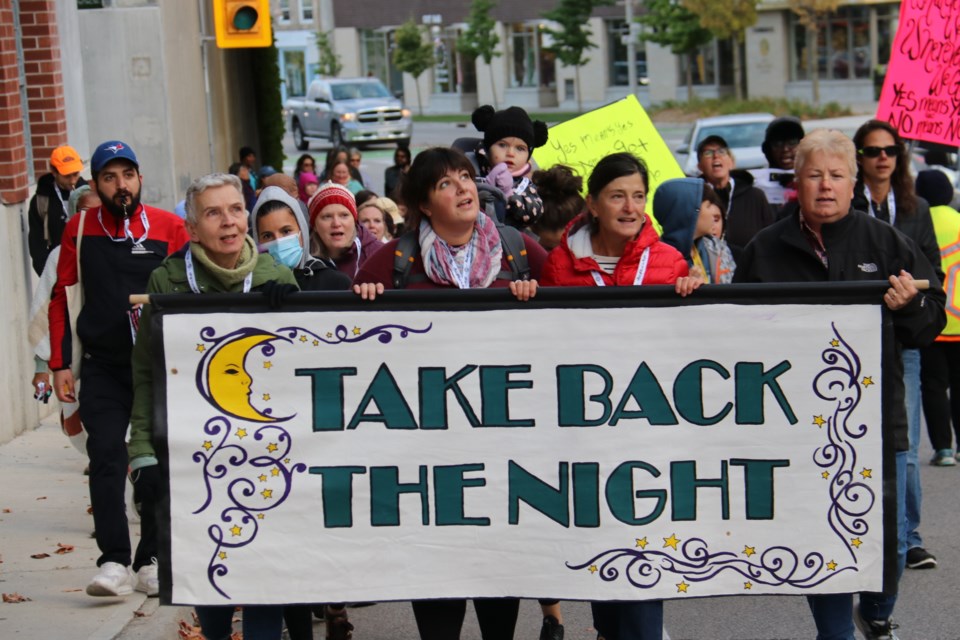More than 50 people gathered at Marianne’s Park Thursday night to Take Back the Night.
Hosted annually by Guelph-Wellington Women in Crisis to reclaim the streets, raise awareness and show solidarity for survivors of sexual and gender-based violence, this year’s rally and march focused on highlighting how sexual violence and reproductive justice are inherently connected.
Blowing whistles and chanting phrases like “survivors unite, take back the night,” the group marched along to the beat of The Sound of Drum group, ending at St. George’s Square.
The theme of the march was “Our Bodies, Our Rights, Our Streets,” after what organizer Cindy McMann said was a recent “rollback” in women’s rights, after the overturning of Roe v. Wade in the U.S.
“We’re hoping the march empowers you to go back out into the world feeling like real systemic change is possible,” McMann said. “This is the part where we get to make stronger noise together than we ever could create on our own.”
“For me, Take Back the Night represents a powerful means of reconnecting with community and reminding myself that feminism is not just a way of thinking and understanding the world – it’s an embodied activist practice,” said speaker Jacqueline Potvin before the march kicked off.
Potvin holds a PhD in women’s studies and feminist research, and has 10 years experience researching issues of gender equality and reproductive justice.
Although she said sexual violence and reproductive justice are "experienced in many different ways, they both represent a way that women and those who do not conform to dominant gender roles and binaries are denied control and power over our bodies, and hence, our lives.”
To end gender inequality and all forms of injustice, she said, we have to work to ensure bodily autonomy for all.
“While we might find comfort in knowing or thinking that in Canada, most of us do not face the same legal barriers, it’s important that in this moment we do not lose sight of or ignore the other barriers that continue to impact access to abortion and other forms of reproductive care in our country and our communities.
“The impact of inequitable access to abortion services is particularly salient, as it significantly affects the ability of women and those who can become pregnant from controlling our bodies and lives,” she said.
Therefore, she said we must work with gender, race and class equality in mind. But she also said we need to work towards eliminating the stigma around abortion and reproductive rights, and that even the language we use can perpetuate this stigma.
“Feminist work on sexual violence has highlighted the dangerous myths that persist around the ‘perfect victim,’ and how these myths shape understandings of who survivors are and which survivors are most deserving and able to access care, compassion and justice.”
Potvin added that sexual reproductive violence has been and continues to be a “key component of colonization on this land,” including the “forced sterilization of Indigenous women, systemic racism in the medical care system, and the horrific legacy of residential schools.”
Addressing those harms, she said, is essential for working towards gender equality, decolonization, reconciliation and justice, and she invited everyone working towards these goals to “critically think about the language you use to advocate for the future.”
The event was live streamed for those who were unable to attend in person. You can watch it here.
